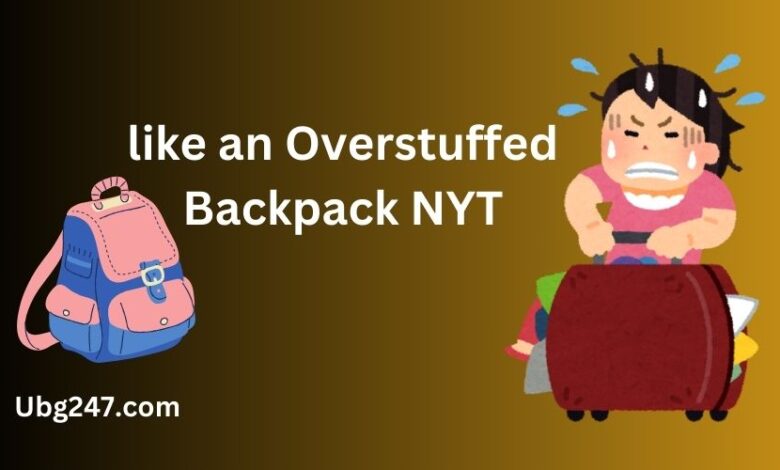Like an Overstuffed Backpack NYT: Understanding the Crossword Clue

The phrase like an overstuffed backpack paints a vivid image of something overly filled, almost bursting at the seams. This descriptive term has been spotlighted in a variety of contexts, most notably as a clue in the New York Times Mini Crossword, challenging solvers to think creatively and concisely. In this article, we’ll delve into the origins, significance, and broader context of this intriguing phrase while also exploring its relevance in popular culture.
What Does “Like an Overstuffed Backpack” Mean?
The phrase describes something that is visibly swollen, packed to capacity, or overflowing. It evokes the imagery of a backpack loaded with books, clothes, or supplies to the point where it bulges outward. Whether literal or metaphorical, it reflects the idea of excess.
For example, the term might describe:
- A cluttered purse that can barely zip shut.
- A day crammed with too many activities.
- A metaphor for overburdened responsibilities.
In the New York Times Mini Crossword, the phrase served as a clever clue leading to the word “bulgy,” perfectly encapsulating the visual and conceptual essence of an overfilled object.

The New York Times Mini Crossword
The New York Times Mini Crossword has become a staple for puzzle enthusiasts, providing a quick yet challenging mental workout. Launched in 2014, this condensed version of the classic crossword is designed to be solved in just a few minutes, making it ideal for busy individuals seeking a brain-teasing diversion.
- Concise and Accessible: Typically consisting of a 5×5 grid, the Mini Crossword is simpler than its full-sized counterpart but no less satisfying.
- Creative Clues: Clues like “like an overstuffed backpack” challenge players to think outside the box, encouraging lateral thinking and vocabulary recall.
- Popularity: Its brevity and clever design have garnered a loyal following, making it a daily ritual for many crossword enthusiasts.
The clue “like an overstuffed backpack” appeared in the February 1, 2024 edition, highlighting the puzzle’s knack for using relatable and imaginative prompts.
Clues and Their Role in Crossword Puzzles
Clues in crossword puzzles are more than just hints; they’re an art form. They balance creativity, ambiguity, and precision to engage solvers. A clue like “like an overstuffed backpack” works on multiple levels:
- Imagery: It conjures a specific visual, making it easier for solvers to relate.
- Synonyms: Encourages solvers to think of descriptive words like “bulgy,” “packed,” or “overfilled.”
- Wordplay: Often, clues involve puns, double meanings, or cultural references, adding an element of fun.
These attributes make crossword solving a stimulating exercise for the mind.
Broader Meanings and Symbolism
Beyond its literal application, “like an overstuffed backpack” serves as a metaphor in various scenarios:
- Life’s Overload: The phrase is often used to describe a person carrying too many responsibilities or emotional burdens.
- Over-preparation: It can also symbolize someone who tries to prepare for every possible scenario, leading to unnecessary excess.
- Cultural Contexts: In literature or media, the image of an overfilled backpack often symbolizes the weight of expectations or an overloaded lifestyle.
For instance, in a coming-of-age movie, a character’s overstuffed backpack might visually represent their attempt to carry everything they think they need for the challenges ahead—both literal and figurative.
How to Approach Clues Like This in Crossword Puzzles
If you encounter a clue such as “like an overstuffed backpack,” here are some tips to solve it:
- Break Down the Imagery: Visualize the clue. What words describe the look of an overfilled object? Think of “bulgy,” “packed,” or “stuffed.”
- Consider Synonyms: Expand your vocabulary with synonyms that fit the description.
- Use Letter Patterns: If other answers have already been filled in, use intersecting letters as a guide.
- Think Simple: Crossword puzzles often rely on straightforward answers, so don’t overcomplicate your thinking.
For the Mini Crossword, brevity is key, so short, punchy answers like “bulgy” are often the solution.
Read To know About: Sabeer Nelli: Redefining Financial Solutions for a Digital Age
Benefits of Solving Crossword Puzzles
Engaging in crossword puzzles like the New York Times Mini Crossword offers numerous advantages:
- Cognitive Boost: Puzzles enhance memory, problem-solving skills, and critical thinking.
- Vocabulary Growth: Encountering clues like “like an overstuffed backpack” expands your word bank.
- Stress Relief: The process of solving puzzles can be meditative, reducing anxiety and improving focus.
- Entertainment: They’re a fun way to pass time while also feeling accomplished.
Regular puzzle-solving can even delay cognitive decline, making it a rewarding habit for individuals of all ages.

Cultural Relevance of “Like an Overstuffed Backpack”
The phrase resonates because it captures a universal experience. Who hasn’t overfilled a backpack, suitcase, or schedule at some point? This relatability makes it a perfect fit for crosswords, literature, and everyday conversation.
In media, such imagery is frequently used to depict:
- A student struggling with a heavy school bag.
- A traveler trying to pack too much for a trip.
- A humorous exaggeration in cartoons or animations.
Its universal appeal ensures that it continues to find relevance in diverse contexts.
The Psychological Impact of Overloading: Lessons from the Phrase
The phrase “like an overstuffed backpack” can symbolize the emotional and psychological toll of taking on too much. It resonates deeply with those who experience stress, anxiety, or burnout due to overwhelming responsibilities. Carrying a heavy backpack, literally or figuratively, parallels the strain of juggling multiple obligations without adequate time to rest.
Key takeaways include:
- Overpacking in Life: Trying to prepare for every eventuality can lead to unnecessary stress.
- Prioritizing Essentials: Just as you should only pack what’s necessary in a backpack, life should focus on core goals and values.
- Seeking Balance: Offloading responsibilities, delegating tasks, or simplifying routines can help alleviate mental weight.
Read More: Live Streaming Services: The Future of Entertainment and Connectivity
The Science of Weight Distribution: Backpacks and Body Strain
Carrying a backpack that’s too heavy or improperly packed can cause physical strain, affecting posture and health. Similarly, the figurative “overstuffed backpack” of life highlights the need for balance and mindful prioritization.
Below is a comparison of healthy backpack habits versus the consequences of overloading, which serves as a useful metaphor for life’s burdens:
| Healthy Backpack Habits | Consequences of Overloading |
|---|---|
| Packing only essentials | Carrying unnecessary weight |
| Distributing weight evenly | Straining shoulders, back, and neck |
| “Regularly reassessing contents“ | Accumulating clutter or unimportant items |
| Using ergonomic straps and designs | Relying on poorly designed or outdated bags |
| “Maintaining proper posture“ | Developing long-term musculoskeletal issues |
By maintaining healthy physical and mental habits, individuals can reduce both literal and figurative strain.
The Role of Metaphors in Everyday Language
“Like an overstuffed backpack” exemplifies how metaphors enrich communication by making abstract ideas more relatable. In this case, the metaphor bridges the gap between a physical object and intangible concepts such as stress, excess, or overburdened schedules.
- In Literature: Writers often use metaphors like this to evoke imagery and convey complex emotions.
- In Psychology: Metaphors help individuals articulate feelings that might otherwise be difficult to express, such as describing stress as a “heavy load.”
- In Education: Teachers use metaphors to simplify complicated ideas for students, ensuring better understanding and retention.
The phrase’s versatility makes it a valuable linguistic tool in both creative and everyday contexts.

Conclusion
“Like an overstuffed backpack” is more than a descriptive phrase; it’s a window into human behavior, creativity, and the art of puzzle-solving. Its appearance in the New York Times Mini Crossword highlights its cleverness and relatability, offering both entertainment and food for thought. Whether used to describe a literal overfilled bag or a metaphorical overload, the phrase connects with audiences in meaningful ways.
Engaging with crossword puzzles that use such imaginative clues enriches vocabulary, sharpens the mind, and provides a momentary escape from life’s own overstuffed backpack of responsibilities. So the next time you encounter this phrase—whether in a crossword or conversation—take a moment to appreciate its depth and charm.
Post You might Like: UBG247: A Hub for Unblocked Games
Frequently Asked Questions (FAQs)
What does “like an overstuffed backpack” mean in NYT Crossword?
It’s a descriptive clue that refers to something bulging or overfilled. The answer to this clue is often “bulgy.”
When did “like an overstuffed backpack” appear in NYT Mini Crossword?
The clue appeared in the February 1, 2024, edition of the New York Times Mini Crossword.
What is the significance of “bulgy” in crossword puzzles?
“Bulgy” is a concise, five-letter word that perfectly describes the visual of an overstuffed backpack.
How is “like an overstuffed backpack” a metaphor?
It symbolizes excess or overload, whether in terms of physical weight, responsibilities, or emotional burdens.
What is the answer to “like an overstuffed backpack” in NYT Crossword?
The answer is “bulgy,” a word that vividly describes an overfilled object.
How does the NYT Mini Crossword differ from the full crossword?
The Mini Crossword is a smaller, quicker version of the full crossword, typically with a 5×5 grid for brief challenges.
Why is “like an overstuffed backpack” relatable?
The imagery of an overstuffed backpack resonates with everyday experiences of excess, making it a clever and relatable clue.
What are common strategies to solve crossword clues?
Focus on synonyms, count letters, and use intersecting words to narrow down the possibilities for solving clues like this.
What makes the NYT Mini Crossword popular?
Its quick, engaging format and clever clues make it a favorite for daily puzzle enthusiasts.
Why do crosswords use descriptive clues like “like an overstuffed backpack”?
Such clues engage solvers by prompting them to visualize and think creatively about possible answers.



One Comment